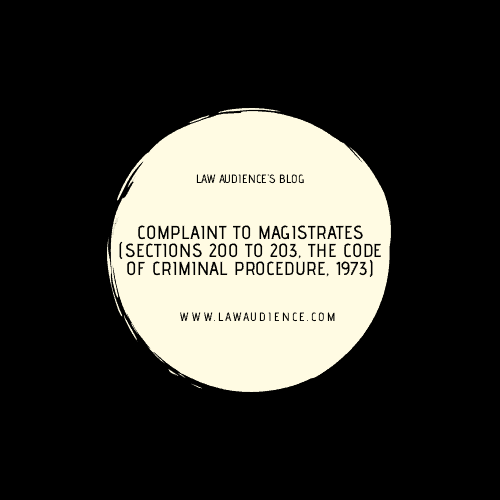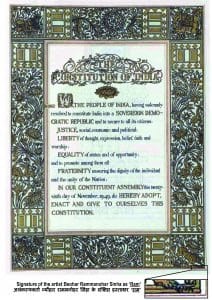AUTHORED BY: MR. AVINASH PANDEY, B.B.A.LL.B, 2ND YEAR STUDENT AT IFIM LAW COLLEGE & RESEARCH WRITER AT LAW AUDIENCE.
I. INTRODUCTION:
“Complaint implies any accusation presented verbally or in drafting to a Magistrate, with perception to take action under the Code of Criminal Procedure, whether familiar or unfamiliar, has perpetrated an assault, but it does not involve a police statement[1].”
To create a charge there must be an accusation made with a view to the receiver exercising action under the Criminal Procedure Code, imposing the same person with a selective offence.
A mere presentation of the petition to a Magistrate to let him take executive action is not a complaint within the titles of the definition[2].
II. ESSENTIALS OF A VALID COMPLAINT:
The essentials of a valid Complaint as per Section 2 (d) of the Code of Criminal Procedure are[3]:
- The accusation must be made to a Magistrate and not to a judge[4].
- The statement must be made with a sense to the Magistrate’s holding action under the Criminal Procedure Code[5].
- A mere declaration to a Magistrate by way of erudition without any purpose of asking him to take action is not a complaint[6].
- The accusation must be that an assault has been perpetrated. It is not important that a distinct offence be stated; only the assertion of fact must establish an offence[7].
III. CORE SECTIONS & RELEVANT JUDGEMENTS:
a) SECTION 200 CRPC (EXAMINATION OF COMPLAINANT):
A Magistrate taking cognizance of an offence on the complaint shall review upon oath the complainant and the witnesses present if any, and the matter of such investigation shall be decreased to writing and shall be approved by the complainant and the witnesses, and also by the Magistrate[8].
In this case, Mr. Rajesh Bhalchandra Chalke v. State Of Maharashtra[9] the Hon’ble court held that “Section 200 applies the terms “shall review” and not “may review”. Hence, the method record-keeping review of the complainant on declaration is compulsory and not voluntary. Dependence is placed on numerous decisions in the provider of the contention that examination of the complainant on testimony is obligatory before publishing method under Section 200 of CRPC”.
b) SECTION 201 CRPC (PROCEDURE BY MAGISTRATE NOT COMPETENT TO TAKE COGNIZANCE OF THE CASE):
If the accusation is made to a Magistrate who is not accountable to take apprehension of the crime, he shall:
(a) If the objection is in written form, return it for presentation to the proper Court with approval to that conclusion;
(b) If the accusation is not in writing, instruct the complainant to the proper Court[10].
In the case of Ramadhar Singh R.D.Singh v. Smt. Ambika Sahu[11] The Hon’ble court stated clearly in the judgement that “Without invading into the worthiness of the matter, what has to be fundamentally seen is the appeal and the prerequisite of the law below which the same has been registered under Section 201 CRPC”.
c) SECTION 202 CRPC (POSTPONEMENT OF ISSUE OF PROCESS):
Any Magistrate, on acceptance of a complaint of an offence of which he is entitled to take cognizance or which has been addressed over to him under section 192, may, if he thinks appropriate, delay the issuance of manner against the involved, and either investigate into the case himself or order an inquiry to be made by a police officer or by such other person as he thinks appropriate, for the view of determining whether or not there is satisfactory ground for operation, Provided that no such injunction for examination shall be made, i) where it appears that the offence complained of is triable exclusively by the Court of Sessions; or ii) where the complaint has not been made by a Court, unless the complainant and the witnesses present (if any) have been examined on oath under section 200[12].
In the case of S.S. Binu v. State of West Bengal & Anr[13]: The Hon’ble court held that “Concerning the sort of the examination, it is proposed by him that the enactment of Section 202 CRPC has two objectives:
(1) To empower the Magistrate to examine precisely the accusations made in the accusation with a view to preventing a person named therein as accused from being asked upon to face an irrelevant, flighty or meritless complaint.
(2) To find out whether there is some material to defend the charges made in the complaint Or in other words, according to him, the learned Magistrate involved is under commitment to arrive at a satisfaction after due application of mind concerning the association of the apprehended in the commission of the offence”.
d) SECTION 203 CRPC (DISMISSAL OF COMPLAINT):
If, after considering the statements on oath (if any) of the complainant and of the witnesses and the result of the inquiry or investigation (if any) under section 202, the Magistrate is of opinion that there is no sufficient ground for proceeding, he shall dismiss the complaint, and in every such case he shall briefly record his reasons for so doing.
In Santokh Singh v. Geetanjali Wollen Pvt. Ltd[14]: In this case, the Court held that if a complaint has been rejected by a Magistrate under section 203 of Crpc then it doesn’t mean that a second complaint cannot be entertained on the same facts and grounds. But, however, it is to be entertained only in special circumstances.
IV. CONCLUSION:
The Courts have supported the prospect that the Magistrate should not reject a Complaint without listening to the witnesses of the complainant who are present in the Court. In additional terms, the plaintiff should be given a chance of ascertaining the fact of his accusations by having his bystander testimony examined by the Court. Nevertheless, the Magistrate would be verified in rejecting a grievance outwardly questioning the eyewitnesses who are slightly indicated by the complaint, but who are not being in the Court. If a charge is in regard to a conflict of a public nature, it ought to be rejected, even if costumed up as a scandal. If, on the other hand, the accusations included in the objection reveal an unlawful offence, the Magistrate should not drop the charge, totally because scientific language is not used in the complaint.
[1] Section 2 (d), The Code of Criminal Procedure, 1973 (India).
[2] Mohd. Yousuf v. Afaq Jahan and Anr. 2006 JT (India): R.R. Chari v. State of U.P. 1951 S.C.R. 312 (India).
[3] supra note 1.
[4] Ibid.
[5] Ibid.
[6] supra note 2.
[7] supra note 1.
[8] Section 200, The Code of Criminal Procedure, 1973 (India).
[9] Mr. Rajesh Bhalchandra Chalke vs State Of Maharashtra 7th Dec 2010
[10] Section 201, The Code of Criminal Procedure, 1973 (India).
[11] Ramadhar Singh @ R.D.Singh vs Smt.Ambika Sahu 27TH Oct 2016
[12] Section 202, The Code of Criminal Procedure, 1973 (India).
[13] S.S. Binu v. State Of West Bengal & Anr on 3th May 2018 (India).
[14] 1993 Cr LJ 3744 (P&H) (India).



